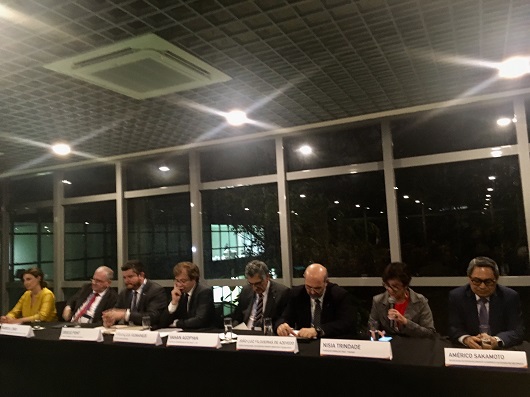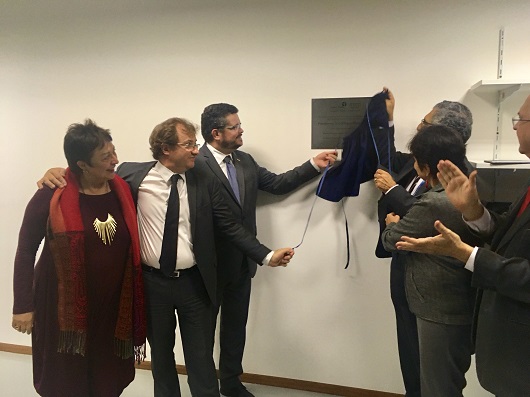New Scientific Platform will be dedicated to emerging diseases
23/07/2019
Julia Dias
The Pasteur Institute, a French foundation for research on infectious disease prevention and treatment, inaugurated the Scientific Pasteur-USP Platform at the University of São Paulo (USP), in São Paulo on July 4. The platform is the result of a scientific partnership between the Pasteur Institute, USP and the Oswaldo Cruz Foundation (Fiocruz) signed in June 2015. This platform will develop research to study emerging pathogens, of which infections can cause damage to the central nervous system, such as the Zika, Dengue, Yellow Fever and Influenza viruses, as well as protozoa such as the trypanosomes that cause the sleeping sickness. The main goal is to develop methods to prevent epidemics of these diseases.

The platform's inauguration activity was attended by Fiocruz's President (photo: Pedro Teixeira)
“This tripartite cooperation is crucial for deepening knowledge and promoting equity - a historic challenge in our country - and for research in the biomedical and public health fields. It is about promoting joint actions in science, technology, innovation and training of human resources,” said Nísia Trindade Lima, President of Fiocruz, during the launch of the Platform, at USP campus in São Paulo.
Located in the Research and Innovation Center (Inova USP), in a 1.700 m² area, the platform will comprise 17 laboratories, of which four are of biosafety level 3 research, comparable to international parameters, where high risk pathogens will be studied. The expected investment is around R$ 40 million, from which R$ 15 million will be invested in equipment.
The inauguration took place during the Americas Regional Meeting of the Pasteur Institutes Network (RIIP), which involved researchers from French Guiana, Guadeloupe, Canada, Uruguay, Costa Rica, France and Brazil from July 3 to 5 at USP. During the event, a symposium discussed the challenges related to emerging diseases and antibiotic resistance, with participation of several researchers from the Foundation. In addition, a meeting on the penultimate day of the event was attended by the President of Fiocruz and addressed the topic of cooperation between the network institutions.

The platform was inaugurated during the Americas Regional Meeting of the Pasteur Institute Network (photo: Pedro Teixeira)
For Mrs. Lima, scientific and technological cooperation should contribute to respond to some contemporary challenges. Among them, she highlights precision public health, a way of dealing with new advances in medicine, such as Big Data, and recent developments in the field of genetic therapy, considering the needs of universal health systems such as the Unified Health System (SUS). The President argues that existing initiatives, such as the recently launched program Inova Fiocruz, can contribute to and, at the same time, benefit from the reciprocal activities to be implemented and reinforced by the recently launched Platform. Likewise, bilateral cooperation already in progress, such as the Translational Platform in collaboration with USP of Ribeirão Preto, should also work in a synergistic manner with the new initiative, seeking to strengthen partnerships.
Another possibility that is also being discussed is the creation of a Pasteur Institute center in Brazil, in the Eusébio Park of Technology, in the facilities of Fiocruz Ceará, inaugurated in 2018. “There are many possibilities, inspired by Louis Pasteur, Oswaldo Cruz, Carlos Chagas, Samuel Pessoa, Luiz Hildebrando, among many other scientific research references aimed at solving the main health problems. I am sure we will advance in the contributions to science and education that are so important to our countries and to global health in contemporary society,” said Nísia, recalling some of the great scientists who made history in the three institutions.
To this day, eight senior researchers have been selected by partners to begin their research on the Pasteur-USP Platform. They are: Paola Minoprio (Paris Pasteur Institute – Global Health Department), Paolo Zanotto (ICB-Microbiology), Edison Durigon (ICB-Microbiology), Patrícia Beltrão Braga (USPLeste/ICB), Jean Pierre Peron (ICB-Immunology), Eduardo Massad (FM-USP), Helder Nakaya (FCF-USP) and Pedro Teixeira (Ensp-Fiocruz). All of them will keep connected to their units of origin and dedicate part of their research to the platform.
Starting in 2020, three others groups of young researchers will be annually selected to join the team. The platform is expected to have a total of 80 to 100 researchers. The project is coordinated by Luís Carlos Ferreira, Director of the Institute of Biomedical Sciences (ICB) of USP, and Paola Minoprio, Research Director of the Pasteur Institute.


